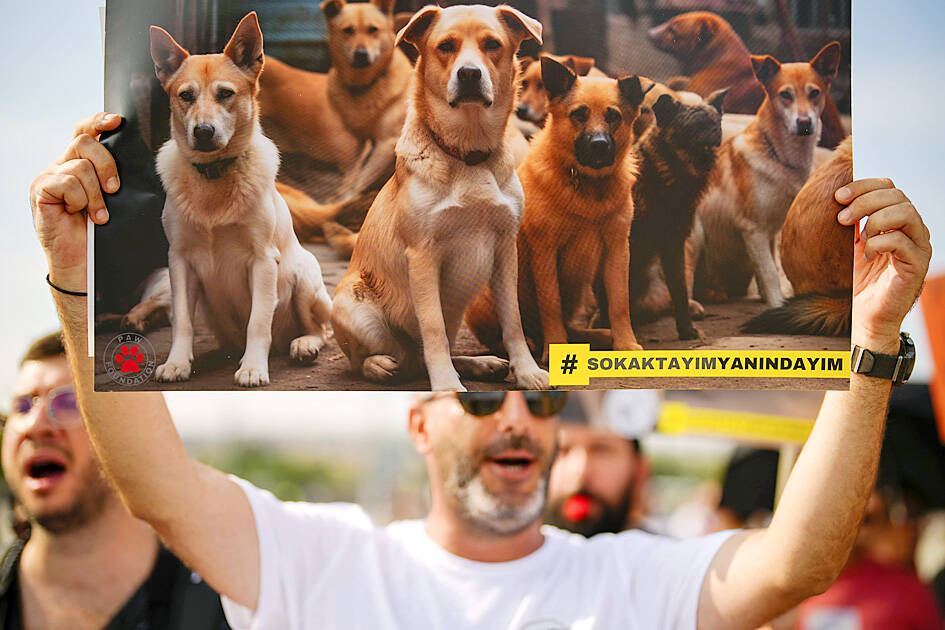Thousands of demonstrators gathered in Istanbul on Sunday to protest recent legislation that critics say is leading to the killing of stray dogs across Turkey.
Citing safety concerns, legislators last month approved the new law aimed at removing millions of stray dogs from the streets. Animal-lovers fear it will lead to widespread culling or dogs ending up in disease-ridden and overcrowded shelters.
Turkish President Recep Tayyip Erdogan said the law was necessary to deal with the nation’s “stray dog problem.”

Photo: AP
The protesters called for the law to be repealed, brandishing posters reading “shelters are death camps” and “withdraw the bloody law.”
“We want this law to be withdrawn immediately,” said protester Hasan Kizilyatak, 64. “They [stray dogs] are living beings, just like us. We are here because we are against them being annihilated.”
Ayten Arslan, 55, who said she supports Erdogan, also showed up to protest.
“Just like we stood beside our president on July 15 [2016] when there was a coup attempt, we are here for the stray animals,” she said. “I say as an AK Party supporter, this law, is a bloody law.”
The main opposition Republican People’s Party moved to repeal the law in the Constitutional Court less than two weeks after it passed.
The government estimates that about 4 million stray dogs roam Turkey’s streets and rural areas. Although most are harmless, several people, including children, have been attacked.
A report released by the Safe Streets and Defense of the Right to Life Association, an organization campaigning for the removal of all stray dogs from the streets, said that 65 people have died in street dog attacks since 2022.
The new legislation requires municipalities to collect stray dogs and house them in shelters to be vaccinated, neutered and spayed before making them available for adoption. Dogs that are in pain, terminally ill or pose a health risk to humans will be euthanized. The initial draft bill included cats, but that article was changed after a public outcry.
However, many question where cash-strapped municipalities would find the money to build the necessary extra shelters required.
Animal rights advocates worry that some municipalities might kill dogs on the pretext that they are ill rather than allocate resources to shelter them.

Kehinde Sanni spends his days smoothing out dents and repainting scratched bumpers in a modest autobody shop in Lagos. He has never left Nigeria, yet he speaks glowingly of Burkina Faso military leader Ibrahim Traore. “Nigeria needs someone like Ibrahim Traore of Burkina Faso. He is doing well for his country,” Sanni said. His admiration is shaped by a steady stream of viral videos, memes and social media posts — many misleading or outright false — portraying Traore as a fearless reformer who defied Western powers and reclaimed his country’s dignity. The Burkinabe strongman swept into power following a coup in September 2022

‘FRAGMENTING’: British politics have for a long time been dominated by the Labor Party and the Tories, but polls suggest that Reform now poses a significant challenge Hard-right upstarts Reform UK snatched a parliamentary seat from British Prime Minister Keir Starmer’s Labor Party yesterday in local elections that dealt a blow to the UK’s two establishment parties. Reform, led by anti-immigrant firebrand Nigel Farage, won the by-election in Runcorn and Helsby in northwest England by just six votes, as it picked up gains in other localities, including one mayoralty. The group’s strong showing continues momentum it built up at last year’s general election and appears to confirm a trend that the UK is entering an era of multi-party politics. “For the movement, for the party it’s a very, very big

A new online voting system aimed at boosting turnout among the Philippines’ millions of overseas workers ahead of Monday’s mid-term elections has been marked by confusion and fears of disenfranchisement. Thousands of overseas Filipino workers have already cast their ballots in the race dominated by a bitter feud between President Ferdinand Marcos Jr and his impeached vice president, Sara Duterte. While official turnout figures are not yet publicly available, data from the Philippine Commission on Elections (COMELEC) showed that at least 134,000 of the 1.22 million registered overseas voters have signed up for the new online system, which opened on April 13. However,

ENTERTAINMENT: Rio officials have a history of organizing massive concerts on Copacabana Beach, with Madonna’s show drawing about 1.6 million fans last year Lady Gaga on Saturday night gave a free concert in front of 2 million fans who poured onto Copacabana Beach in Rio de Janeiro for the biggest show of her career. “Tonight, we’re making history... Thank you for making history with me,” Lady Gaga told a screaming crowd. The Mother Monster, as she is known, started the show at about 10:10pm local time with her 2011 song Bloody Mary. Cries of joy rose from the tightly packed fans who sang and danced shoulder-to-shoulder on the vast stretch of sand. Concert organizers said 2.1 million people attended the show. Lady Gaga